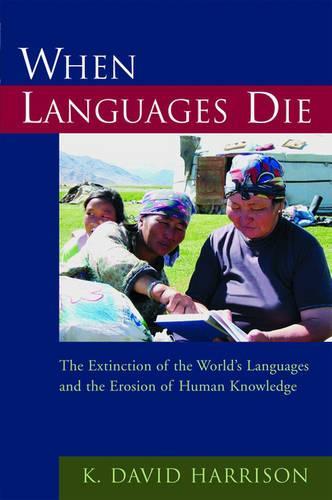Overview
It is commonly agreed by linguists and anthropologists that the majority of languages spoken now around the globe will likely disappear within our lifetime. The phenomenon known as language death has started to accelerate as the world has grown smaller. This extinction of languages, and the knowledge therein, has no parallel in human history. K. David Harrison's book is the first to focus on the essential question, what is lost when a language dies? What forms of knowledge are embedded in a language's structure and vocabulary? And how harmful is it to humanity that such knowledge is lost forever? Harrison spans the globe from Siberia, to North America, to the Himalayas and elsewhere, to look at the human knowledge that is slowly being lost as the languages that express it fade from sight. He uses fascinating anecdotes and portraits of some of these languages' last remaining speakers, in order to demonstrate that this knowledge about ourselves and the world is inherently precious and once gone, will be lost forever. This knowledge is not only our cultural heritage (oral histories, poetry, stories, etc.) but very useful knowledge about plants, animals, the seasons, and other aspects of the natural world--not to mention our understanding of the capacities of the human mind. Harrison's book is a testament not only to the pressing issue of language death, but to the remarkable span of human knowledge and ingenuity. It will fascinate linguists, anthropologists, and general readers.
Full Product Details
Author: Harrison
Publisher: Oxford University Press Inc
Imprint: Oxford University Press Inc
Edition: 2nd edition
Dimensions:
Width: 15.60cm
, Height: 2.20cm
, Length: 23.40cm
Weight: 0.557kg
ISBN: 9780195181920
ISBN 10: 0195181921
Pages: 304
Publication Date: 01 February 2007
Audience:
Adult education
,
Professional and scholarly
,
Further / Higher Education
,
Professional & Vocational
Replaced By: 9780195372069
Format: Paperback
Publisher's Status: Active
Availability: Manufactured on demand

We will order this item for you from a manufactured on demand supplier.
Reviews
""Harrison brings the personal as well as the academic to this very interesting and readable book."" --Language Documentation & Conservation ""Engaging and non-technical enough to arouse the interest of non-linguists, but wide-ranging enough and well-sourced enough to appeal to linguists as well."" --Linguist List ""Harrison tackles the question of what is lost when a language dies from the vantage point of field studies with some of the few remaining speakers of endangered languages in Siberia, Mongolia, and elsewhere. When Languages Die reveals an astonishingly rich catalog of human intellectual heritage and scientific knowledge on the verge of disappearing as many of the world's small languages become extinct."" --Suzanne Romaine, Oxford University ""Depending on how one counts, it is likely that hald of the world's languages will be lost over the next thirty years, a dramatic change in human history. Harrison explores dying languages, how they differ from stable languages, how they encode cultural information that is lost with them, how their speakers behave, and much more. He tells a fascinating and tragic story of immense drama."" --David W. Lightfoot, National Science Foundation ""Written in clear and concise prose, When Languages Die provides a captivating account of how languages encode and categorize human knowledge and experience. Harrison brings together a wealth of examples from all over the world to illustrate just how very much is lost when a language ceases to be spoken. The book is a must-read for anyone interested in people and how we think, perceive, and understand the world we live in."" --Lenore A. Grenoble, Dartmouth College ""Harrison brings the personal as well as the academic to this very interesting and readable book."" --Language Documentation & Conservation ""Harrison tackles the question of what is lost when a language dies from the vantage point of field studies with some of the few remaining speakers of endangered languages in Siberia, Mongolia, and elsewhere. When Languages Die reveals an astonishingly rich catalog of human intellectual heritage and scientific knowledge on the verge of disappearing as many of the world's small languages become extinct."" --Suzanne Romaine, Oxford University ""Depending on how one counts, it is likely that hald of the world's languages will be lost over the next thirty years, a dramatic change in human history. Harrison explores dying languages, how they differ from stable languages, how they encode cultural information that is lost with them, how their speakers behave, and much more. He tells a fascinating and tragic story of immense drama."" --David W. Lightfoot, National Science Foundation ""Engaging and non-technical enough to arouse the interest of non-linguists, but wide-ranging enough and well-sourced enough to appeal to linguists as well."" --Linguist List ""Written in clear and concise prose, When Languages Die provides a captivating account of how languages encode and categorize human knowledge and experience. Harrison brings together a wealth of examples from all over the world to illustrate just how very much is lost when a language ceases to be spoken. The book is a must-read for anyone interested in people and how we think, perceive, and understand the world we live in."" --Lenore A. Grenoble, Dartmouth College
In this scholarly yet very readable study, Harrison writes powerfully of the value and beauty of these vanishing knowledge systems. PD Smith, The Guardian K. David Harrison makes an excellent case for studying our disappearing languages. Intrepid and dedicated, he is committed to salvaging what he can before it is too late. Gregory Norminton, TLS




